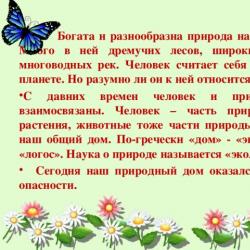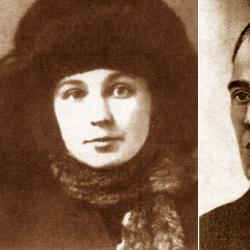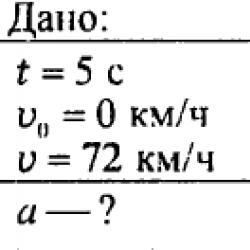You will lose this hand of yours. Marina Tsvetaeva "Motherland": analysis of the poem. Analysis of Tsvetaeva’s poem “Motherland”
Marina Tsvetaeva’s poem “Motherland” was written in 1932. It can be attributed to the patriotic lyrics of the poetess. This poetic work became a pass for Tsvetaeva; it allowed the poetess to return home to Russia. But that will come later.
It so happened that Marina Tsvetaeva was forced to spend a third of her life in exile. At first she lived in France, where she studied literature. After the revolution, she was forced to emigrate with her family to Prague and then to Paris. The poetess did not accept the utopian ideas of Bolshevism, which turned into a real tragedy for the country. In 1922, Tsvetaeva managed to obtain permission to emigrate. Together with her husband Sergei Efront and children, she left the country, which was mired in chaos and devastation, hunger and poverty.
But the poetess quickly became bored with her calm and measured life. Tsvetaeva began to feel homesick. She dreamed of returning to Moscow again. Marina Ivanovna was not afraid of repression, bloody terror and the destruction of the intelligentsia; she wanted to return home. The decision was taken. Tsvetaeva’s family began collecting documents that would allow her to return to Russia.
The poem “Motherland” became a decisive argument, because in it the Soviet authorities saw the patriotic spirit of the poetess. At that time, the main task of the party was to create a myth about the greatness and invincibility of Russia and cultivate this idea among the common population. The Bolsheviks hoped to realize this idea through the creative works of Yesenin, Blok, and Mayakovsky.
Having read the poem “Motherland”, we will not find a single flattering word addressed to the Bolshevik Party, and there is also no criticism of it. This is a work of remembrance. Tsvetaeva dreamed of returning to her homeland, forgetting all the horror that she had experienced during the years of the revolution. She calls Russia “far away land”, which has become a foreign land for her and at the same time says that “Russia, my homeland!” The poetess is ready to step over her pride in order to return home again.
This poetic work has a rather complex structure and may seem incomprehensible at first. The patriotism of this work lies not in the glorification of Russia as a mighty power, but in the ability to accept and love it with all its shortcomings.
In the last stanza, Tsvetaeva once again emphasizes that for her homeland she is ready to lose both hands and “sign with her lips on the chopping block.” The poetess could not exchange the feelings of a huge country, her homeland, for feelings of personal happiness and prosperity.
In 1932 (the year of emigration), Marina Tsvetaeva wrote the poem “Motherland”. During the period of writing, the poetess was tormented by an irresistible longing for her native place. She is haunted by the distance from Russian lands; fate brings the heroine to foreign lands, where she receives new impressions. Parting with her homeland had a very tragic meaning for Tsvetaeva. She began to feel like an outcast, a lonely and rejected person. In the poem, she is a lyrical hero who madly dreams of returning home, as a result of which the main theme of the poem emerges: the contrast between a foreign land and her home. I think that one cannot say that a work is sad or joyful. It carries a neutral mood. In order to convey all the experiences and feelings of Marina Tsvetaeva, she used such means of expression as epithet, anaphora, antithesis, personification, rhetorical appeal, and oxymoron. The rhyme of the poem is cross. The meter is iambic tetrameter. This poem by the poetess, in my opinion, is one of the best, it is very sincere, saying a lot.
To whom and what does the poet dedicate his creations? To a lover or lover, friends, parents, childhood and youth, events from the past, teachers, the universe... And it is difficult to find a poet who would completely bypass the Motherland in his work. Love and hatred for her, experiences, thoughts, observations are reflected in poems. The theme of the Motherland is also developed in Let's look at its originality in the poems of the poetess of the Silver Age.
Leitmotif
Marina Tsvetaeva, who spent a considerable part of her life in exile, is rightfully considered a Russian poetess. And this is not without reason. Many researchers confirm that the work of this witness to the terrible turning points in Russian history is a chronicle not only of love, but also of the Motherland at the beginning of the 20th century.
We can absolutely say that Marina Tsvetaeva loves Russia. She passes through all the disturbing, ambiguous events, analyzes them in her work, and tries to develop a clear attitude towards them. Including delving into ancient history (“Stenka Razin”).
The theme of the White Guard is also alive in her work. Marina Ivanovna did not accept the revolution; she was horrified by the Civil War.
Russia
Discussing the theme of the Motherland in Tsvetaeva’s work, we note that her works have a strong feminine element. For her, Russia is a woman, proud and strong. But always a victim. Tsvetaeva herself, even in emigration, always considered herself part of a great country and was its singer.

Biographers admire the independence, strong and proud spirit of Marina Tsvetaeva. And her perseverance and courage were drawn precisely from her ardent and enduring love for the Fatherland. Therefore, the theme of the Motherland in Tsvetaeva’s poetry is rightfully considered one of the leading ones.
It’s amazing how emotionally powerful the poetess’s works about the Motherland are! Nostalgic, tragic, hopeless and painfully sad. But, for example, “Poems about the Czech Republic” is her declaration of love for Russia and its people.
Childhood
The brightest, most joyful notes in Tsvetaeva’s poems about the Motherland appear when she writes about her childhood spent in Tarusa-on-Oka. The poetess returns there with tender sadness in her work - to the Russia of the past century, which can no longer be returned.

Here Tsvetaeva's Russia is boundless open spaces, amazing natural beauty, a sense of security, freedom, flight. Holy land with courageous and strong people.
Emigration
It must be said that the reason for Tsvetaeva’s emigration was not her ideological considerations. Circumstances prompted her departure - she followed her husband, a white officer. From the biography of the poetess it is known that she lived in Paris for 14 years. But the sparkling city of dreams did not captivate her heart - and in emigration the theme of the Motherland is alive in Tsvetaeva’s work: “I am alone here... And Rostand’s poem cries in my heart, as it is there, in abandoned Moscow.”

At the age of 17 she wrote her first poem about Paris. Bright and joyful, he seemed sad, big and depraved to her. "In big and joyful Paris, I dream of grass, clouds..."
Keeping the image of her dear Motherland in her heart, she always secretly hoped for a return. Tsvetaeva never harbored a grudge against Russia, where her work, a truly Russian poetess, was not accepted and unknown. If we analyze all her works in exile, we will see that the Fatherland is Tsvetaeva’s fatal and inevitable pain, but one with which she has come to terms.
Return. Moscow
In 1939, Tsvetaeva returned to Stalinist Moscow. As she herself writes, she was driven by the desire to give her son a homeland. It must be said that from birth she tried to instill in Georgy a love for Russia, to convey to him a piece of this strong, bright feeling of hers. Marina Ivanovna was sure that a Russian person could not be happy away from his Motherland, so she wanted her son to love and accept such an ambiguous Fatherland. But is she happy to be back?
The theme of the Motherland in Tsvetaeva’s works of this period is the most acute. Returning to Moscow, she did not return to Russia. It’s a strange Stalinist era with denunciations, boarded up shutters, general fear and suspicion. It’s hard and stuffy for Marina Tsvetaeva in Moscow. In her creativity, she strives to escape from here into the bright past. But at the same time, the poetess extols the spirit of her people, who went through terrible trials and did not break. And she feels like a part of him.
Tsvetaeva loves the capital of the past: “Moscow! What a huge hospice house!” Here she sees the city as the heart of a great power, a repository of its spiritual values. She believes that Moscow will spiritually cleanse any wanderer and sinner. “Where I’ll be happy even if I’m dead,” Tsvetaeva says about the capital. Moscow evokes sacred awe in her heart; for the poetess it is an eternally young city, which she loves like a sister, a faithful friend.

But we can say that it was the return to Moscow that ruined Marina Tsvetaeva. She could not accept reality, disappointments plunged her into severe depression. And then - deep loneliness, misunderstanding. Having lived in her homeland for two years after her long-awaited return, she voluntarily passed away. “I couldn’t bear it,” as the poetess herself wrote in her suicide note.
Poems by Tsvetaeva about the Motherland
Let's see which of her glorious works M. Tsvetaeva dedicated to Russia:
- "Motherland".
- "Stenka Razin"
- "People".
- "Wires."
- "Homesickness".
- "A country".
- "Swan Camp".
- "Don".
- "Poems about the Czech Republic."
- Cycle "Poems about Moscow" and so on.
Analysis of the poem
Let's take a look at the development of the theme of Russia in one of Marina Tsvetaeva's significant poems, "Longing for the Motherland." After reading the work, we immediately determine that these are the thoughts of a person who finds himself far from his beloved country. And indeed, the poem was written by Marina Ivanovna in exile.
The lyrical heroine of the work copies the poetess herself with amazing accuracy. She tries to convince herself that when a person feels bad, it makes no difference where he lives. An unhappy person will not find happiness anywhere.
Re-reading the poem again, we will notice Hamlet's question in the paraphrase “To be or not to be?” Tsvetaeva has her own interpretation of it. When a person lives, there is a difference where he is, but when he exists, suffering, there is no difference.
"...it doesn't matter at all -
Where all alone
She bitterly claims that all the feelings in her soul have burned out, all that remains is to humbly carry her cross. After all, wherever a person is far from his homeland, he will find himself in a cold and endless desert. Key phrases are scary: “I don’t care,” “I don’t care.”
The heroine tries to convince herself that she is indifferent to the place where her soul was born. But at the same time she says that her real home is the barracks. Tsvetaeva also touches on the theme of loneliness: she cannot find herself either among people or in the lap of nature.

At the conclusion of her story, she bitterly asserts that she has nothing left. In emigration everything is alien to her. But still:
"...if there is a bush along the way
It gets up, especially the mountain ash..."
The poem ends at an ellipsis. After all, the most severe longing for the Fatherland cannot be fully expressed.
The theme of the Motherland in Tsvetaeva’s work is tragic. She is suffocating away from her, but it is also hard in contemporary Russia. Light sadness and touching notes can be traced in her poems only when the poetess remembers her childhood, about the past Russia, Moscow, which can no longer be returned.
Oh, stubborn tongue!
Why simply - man,
Understand, he sang before me:
“Russia, my homeland!”
But also from the Kaluga hill
She opened up to me -
Far away, distant land!
Foreign land, my homeland!
Distance, born like pain,
So homeland and so -
Rock that is everywhere, throughout
Dal - I carry all of it with me!
The distance that has moved me closer,
Dahl saying: "Come back
Home!" From everyone - to the highest stars -
Taking pictures of me!
No wonder, water pigeons,
I hit my forehead with distance.
You! I’ll lose this hand, -
At least two! I'll sign with my lips
On the chopping block: the strife of my land -
Pride, my homeland!
Analysis of the poem “Motherland” by Tsvetaeva
The poetess Marina Tsvetaeva spent most of her life abroad. However, wherever she lived, she was followed. Marina Ivanovna expressed these thoughts in poetry. In 1932, Tsvetaeva wrote the poem “Motherland,” in which she outlined all her experiences.
In this poem, a red thread runs through the idea of the connection of all people with their native land. Tsvetaeva puts herself next to a simple Russian man and is incredibly proud of this fact. The poetess writes that her desire to return home to her native land is very strong, that the call of the heart is stronger than the voice of reason. Tsvetaeva claims that she is ready to defend and praise the Fatherland until her last breath, that she is proud of her Motherland and is ready to share its fate with it.
The lyrical heroine of the poem suffers from the inability to be at home again, worries and complains about the obstacles that stand in her way to return. At the end of the work, the heroine conducts a kind of dialogue with her Motherland. The poetess addresses her with the short pronoun “You!”, demonstrating strong emotional tension. This tension is intensified by epithets, antitheses, and oxymorons.
Some critics believe that Tsvetaeva wrote “Motherland” in order to be able to return to the USSR, that the poetess was currying favor with Soviet officials. However, in this poem there is not a single word about praising the young Soviet state, there is only longing for the lost native land. This poem does not praise the present, it is permeated with nostalgic sadness for the past. For the poetess, her native fatherland is “distant, distant land”, which has become a foreign land. Tsvetaeva’s patriotism does not lie in praising the state system, but in accepting her country as it is, in the desire to share a common destiny with it.
The fate of Tsvetaeva herself and her family after returning to the USSR turned out to be tragic. Her husband was sentenced to death, her daughter was sent into exile for 15 years, her son died at the WWII front, and she herself committed suicide in 1941.
A striking example of Tsvetaeva’s patriotic lyrics, the poem “Motherland” has six stanzas, five of them are quatrains, and the sixth is a two-line distich. The work is written in iambic tetrameter using a “masculine” rhyme (emphasis on the last syllable). Various means of artistic expression are used: rhetorical appeals, epithets, antitheses. The conflicting feelings of the lyrical heroine are expressed by the oxymorons “foreign land, my homeland” and “the distance that has made me close.”
The 17 years spent abroad (1922-1939) could not but arouse feelings of longing for the Motherland in such a vulnerable and delicate nature as Marina Tsvetaeva. In 1932, in May, the poetess wrote the poem “Motherland,” the analysis of which I propose.
I’ll start from afar - the poems were written in May and later the poetess had to suffer and be beaten to the grave when she, driven by “Motherland,” committed suicide. Of course, this is a comparison and nothing more, the month of May is not to blame for anything - such is Tsvetaeva’s fate, such were the morals of those in power who did not want to give the floor to a free voice.
The poem made its fatal contribution to the fate of the poetess. It was this that was assessed when obtaining permission to return to the USSR. Severe examiners did not find anything indecent in him and allowed Tsvetaeva to return to her native land. They “let” into the Union someone who glorified the Russian land, and there they drove him to suicide - isn’t this cynicism?
Most critics claim that the poem “Motherland” is an example of patriotic poetry - I disagree. The verses sing a song to the Russian EARTH, and not to the country to which the poetess returns and where rejection, oblivion and death await her. Others who are good at picking apart other people's lines say that the poems were written specifically for the return - their goal was to “butter up” the Soviet regime. Nonsense - in 1932, Tsvetaeva did not even think about returning.
These disagreements with a number of generally accepted assessments do not take away the value of the work. Complex iambic tetrameter allows you to escape from the attractiveness of rhyme and focus on the internal content of the poem.
The distance, by which Russia is meant, beckons and calls the poetess, but only the Russian land remains the same, everything else has changed.
The last quatrain is symbolic:
You! I’ll lose this hand, -
At least two! I'll sign with my lips
On the chopping block: the strife of my land -
Pride, my homeland!
The address to “you” is personal, which emphasizes the spiritual impulse, but at the same time Tsvetaeva calls the Motherland pride, although the lines can be interpreted as an appeal to one’s pride, which prevents one from returning. One way or another, the homeland met Tsvetaeva’s husband with the chopping block, her daughter with hard labor, and poverty, which brought the poetess herself to the ropes.
Oh, stubborn tongue!
Why simply - man,
Understand, he sang before me:
“Russia, my homeland!”
But also from the Kaluga hill
She opened up to me -
Far away, distant land!
Foreign land, my homeland!
Distance, born like pain,
So homeland and so -
Rock that is everywhere, throughout
Dal - I carry all of it with me!
The distance that has moved me closer,
Dahl saying: "Come back
Home!" From everyone - to the highest stars -
Taking pictures of me!
No wonder, water pigeons,
I hit my forehead with distance.
You! I’ll lose this hand, -
At least two! I'll sign with my lips
On the chopping block: the strife of my land -
Pride, my homeland!






